Long-tail keywords offer numerous benefits. Most notably, they’re able to drive more targeted traffic than short-tail keywords. As a result, your conversion rates improve significantly. So how do you go about finding the long-tail keywords to enhance your SEO? There are several quality long-tail keyword discovery tools available online to help you generate the terms you need. You just have to find the one that fits your needs.
To help you out, we’ve listed our top 12 long-tail keyword discovery tools to get you started.
Top 12 Long-Tail Keyword Tools
1. SEMrush
SEMrush is a complete SEO suite. In fact, it was the first SEO tool that was built to find the keywords your competitors are ranking for. It takes away all of the guesswork you may be accustomed to with traditional keyword research. Instead, it helps you to find long-tail keywords and the sites that are ranking for them in minutes. It’s also considered to be one of the best long-tail keyword discovery tools available. But you can be the judge of that. They offer a 7-day free trial!
Here is just a sample of some of the information you will obtain using SEMrush’s keyword tool. We’ve selected, “how to build a website,” as the example long-tail keyword.
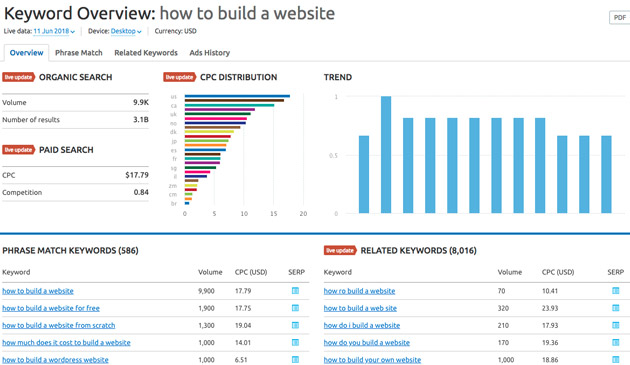
2. Answer The Public
With Answer The Public, you can find question-focused keywords – relevant to the way people search. When using this helpful keyword research tool, you only need to search for a keyword, and it will show you all the common questions asked related to that topic.

3. ScrapeBox
One feature of ScrapeBox that isn’t well-known is the keyword scraper tool. Primarily, the tool works similarly to UberSuggest, but it provides more results. You can also filter duplicate keywords and download the search results to a CSV file.

4. UberSuggest
UberSuggest gets its information from Google Suggest. However, what makes this tool unique is it provides numerous keyword suggestions. It takes your basic keyword and adds each letter in the alphabet after the keyword you entered, thus resulting in a multitude of suggested keywords. Of course, many keywords won’t make any sense to your website, so be selective in the terms you choose.

5. KWFinder
KWFinder is a relatively new tool in the market of long-tail keyword tools. However, it has exceptional features and functionalities that give it an edge over all the other new keyword research tools. It provides you with all the essential data about the keywords you’re searching for, such as the difficulty level, so you can quickly find “easy to rank” keywords you can add to your list.
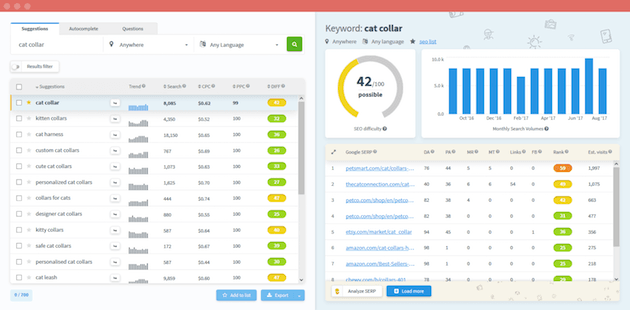
Photo courtesy of KWFinder.com
6. Google Auto Complete Tool
Google’s Auto-Suggestion is one of the most helpful, free long-tail keyword discovery tools. It’s a handy feature Google provides which allows you to find long-tail keywords easily, regardless of the niche. Google auto-populates the keywords depending on their popularity. So, you only need to type in the first keyword and select options from the auto-suggestions. When using this tool, remember that you will also need to make use of another keyword tool if you want to see additional details like CPC, number of searches, the competition, etc.
To get started, begin typing in your keyword in your search bar. For example, if you use the term “how to build a website,” Google will auto-suggest other key terms as shown below.

7. Ahrefs
Ahrefs is another fantastic tool you can use to rank well in search engines. With Ahrefs, you get access to tools that help to research your competitors, monitor your niche, and grow your search traffic. It can also assist you in analyzing your competitors’ search traffic and keywords so you can better understand why your competitors rank well and what steps you should take next to get ahead of them.
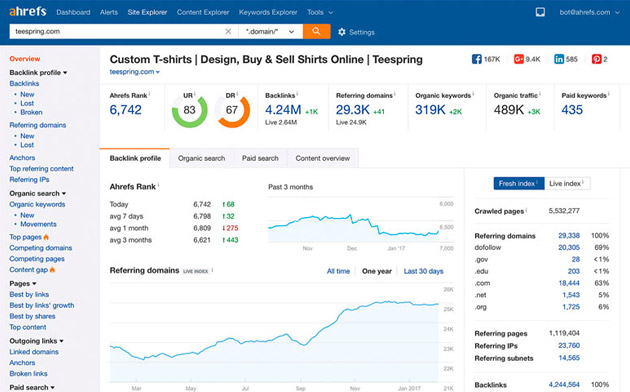
Photo courtesy of Ahrefs.com
8. WordTracker Keyword Discovery Tool
WordTracker Keyword Tool is another popular SEO keyword tool that can help you can find profitable long-tail keywords easily. It also provides many other important details, such as keyword effectiveness, keyword in anchor and text, and competition. With the free account, you can get up to 100 keyword results.
If you select to try out the 7-day free trial, you get to enjoy additional features, such as:
-
-
- See up to 2000 search results
- Use related search tools
- Gain access to search engine data using SEMrush
- Get the option to save your list
- KEI and competition details
-
Photo courtesy of Wordtracker.com
9. Long Tail Pro
Long Tail Pro is another paid tool that allows you to find long-tail keywords while providing other beneficial features. Previously, Long Tail Pro was primarily a desktop-based solution. Now, everything is on “the cloud.” You can also enjoy a free trial to decide whether or not you like it.
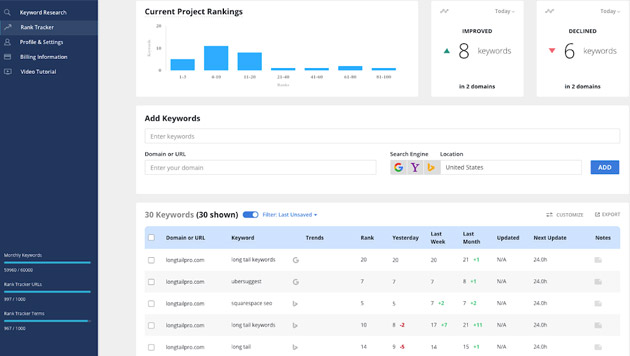
10. Google’s Related Searches
Google Related Searches has the same principle as Google Suggestions; related searches appear when you type in your query. The only difference is that Google Related Searches provides the related long-tail keywords which appear below the very first page of organic results, right at the bottom of the SERP. It also offers slightly more suggestions, and the related searches are personalized in many cases. For instance, sometimes they include your geographical location.
To begin, type a long-tail keyword into Google Search and hit enter. Scroll to the bottom of the paper to see the results. Again, we used the long-tail keyword, “how to build a website,” to provide an example.

11. Soovle.com
Easy to use and free, Soovle shows keyword suggestion results from websites such as YouTube, Google Suggest, Ask.com, Amazon, and Wikipedia. What makes this keyword tool so great? The fact that it displays keywords from sites that are commonly overlooked by your competitors.

12. KeywordTool.io
Another free tool, KeywordTool.io is excellent for generating ideas for long-tail keywords. It is similar to UberSuggest in that it also grabs the results from Google Suggest. However, what makes it superior is that it adds characters both before and after the keyword you entered, resulting in an impressive number of keywords from the same search.
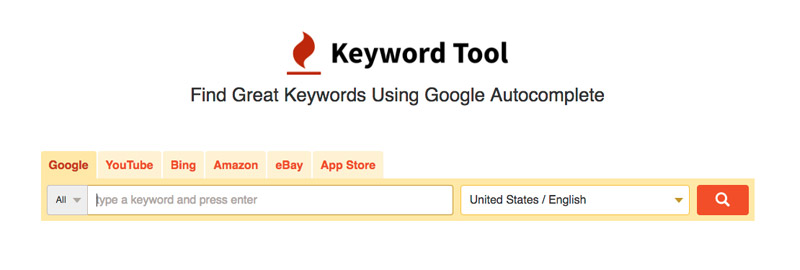
Your Next Steps
Now that we’ve provided you with some of the best long-tail keyword discovery tools available, it’s time to put them to use. Enhance your SEO strategy and determine how you’re going to increase your organic website traffic. If you have any questions along the way, let us know. We’ll be happy to assist.
